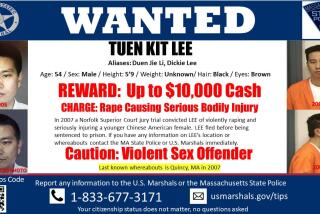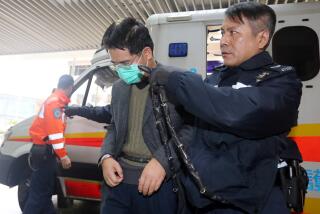Taiwanese Gang Member Guilty of Author’s Murder
- Share via
SAN FRANCISCO — A jury on Wednesday convicted a Taiwanese gang member of murdering author Henry Liu in 1984, a killing the defendant claimed was ordered by the Taiwan government and had been approved by the son of the nation’s president.
The Superior Court jury in Redwood City, 20 miles south of here, took 45 minutes to find Tung Kuei-sen guilty of first-degree murder, making him the only person to be convicted in this country of the murder, which drew international attention.
In a statement read to jurors Wednesday, Tung, 35, said he had been told that Chiang Shiao-wu, son of the late Taiwan President Chiang Ching-kuo, had approved the killing of Liu, a Chinese-language writer of books and articles critical of the then-ruling Chiang family. Chiang Shiao-wu, grandson of former Chinese Nationalist leader Chiang Kai-shek, is a former chief of Taiwan’s secret police and is now a member of the Taiwan trade delegation to Singapore.
“This was not the act of an individual, and this was not the act of a gang. This was the act of the government,” he said in the statement at the end of the trial.
The Taiwanese government has previously denied that any member of the Chiang family approved the murder.
In testimony earlier in the week, Tung testified that he shot Liu in the garage of his home in suburban Daly City at the direction of Chen Chi-li, the leader of United Bamboo, Taiwan’s largest criminal organization. He said Chen led him to believe that Liu had become a double agent for Taiwan and its arch-enemy, China.
Tung recalled that in a meeting with Chen and a Taiwanese military officer two weeks after the Oct. 15, 1984, murder, he was told that Chiang Shiao-wu knew about the killing before it happened.
“He said that if we did the job we would be doing a great service to our country,” Tung said, quoting Chen’s statement of what Chiang Shiao-wu had purportedly said.
Expression of Regret
Tung said he later learned that Liu, an American citizen who had come from Taiwan in 1968, was a journalist and author of Chinese-language articles and books that were critical of the regime of the then-ruling Chiang family.
“I deeply regret that I have killed Henry Liu. I love my country and so I killed Henry Liu and now I have no way out,” he testified through an interpreter.
Chen is serving a life sentence in Taiwan after being convicted there in 1985 for his role in Liu’s murder. Chen said in his trial in Taiwan that he acted under the orders of Vice Adm. Wang Hsi-ling, then head of military intelligence in Taiwan. Wang was sentenced to life in prison for his role in the crime. Wu Tun, who along with Tung shot Liu, was tried with Chen in Taiwan and also is serving a life sentence there.
Taiwan officials have denied that the conspiracy extended beyond Wang.
Attorney’s Viewpoint
Douglas Gray, Tung’s attorney, had argued that Tung acted in the “heat of passion” out of “love of his country,” and that Judge Margaret Kemp should have instructed the jurors that they could have returned a lesser verdict of voluntary manslaughter. But Gray said that when the judge refused to give jurors that option, she left them little choice but to find him guilty of first-degree murder.
“The judge directed a verdict of murder-one. . . . My only surprise is why they were out so long,” Gray said.
Kemp set sentencing for May 11. Tung faces a sentence of 27 years to life in prison.
Deputy Dist. Atty. Robert Bishop told jurors in his closing argument that they should not consider Tung’s plea for sympathy or claim that he was acting in the belief that he was under orders from his government.
After the murder, Tung fled the United States, first to Taiwan, and later to Brazil, where he was arrested in September, 1985, at the request of U.S. authorities. He is serving 20 years in a separate 1986 federal conviction in New York for conspiracy to import heroin from Thailand.
More to Read
Sign up for Essential California
The most important California stories and recommendations in your inbox every morning.
You may occasionally receive promotional content from the Los Angeles Times.










